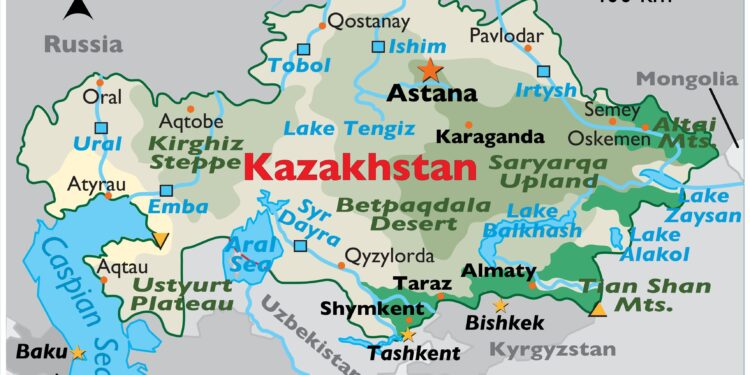Kazakhstan has taken a significant step in regulating emerging technologies with the recent approval of a comprehensive Artificial Intelligence (AI) law. The new legislation, which was closely analyzed by legal experts at Dentons, sets out crucial provisions addressing the intersection of AI and intellectual property, particularly focusing on copyright issues. This landmark law aims to provide clear legal frameworks for AI development and deployment, ensuring protection for creators while fostering innovation in the country’s rapidly evolving digital landscape.
Kazakhstan Enacts AI Legislation Focusing on Copyright Challenges
Kazakhstan’s newly enacted AI law marks a significant step toward addressing the complex intersection of artificial intelligence and copyright. The legislation explicitly recognizes the challenges posed by AI-generated content, establishing clear guidelines for ownership, liability, and protection of intellectual property rights in this rapidly evolving field. Notably, the law delineates the responsibilities of AI developers and users, ensuring that copyright infringement issues are mitigated while fostering innovation and fair use within the digital economy.
Key provisions include:
- Attribution requirements: Entities deploying AI must provide clear disclosure of AI-generated works.
- Ownership clarity: Copyright protection is granted only when human creative input can be demonstrated in AI-assisted works.
- Liability framework: Clear accountability is defined for unauthorized use or replication of copyrighted material by AI systems.
| Provision | Impact | Implementation Date |
|---|---|---|
| Attribution & Disclosure | Enhances transparency in AI content creation | July 2024 |
| Human Input Requirement | Limits automatic copyright claims on AI-only works | July 2024 |
| Liability Rules | Clarifies legal responsibility for content misuse | July 2024 |
Analyzing the Impact of AI on Intellectual Property Rights in Kazakhstan
The newly enacted AI law in Kazakhstan marks a transformative step in the country’s approach to intellectual property rights within the rapidly evolving digital landscape. Recognizing the unique challenges posed by AI-generated works, the legislation introduces specific provisions clarifying the ownership and copyright status of content created autonomously or collaboratively by AI systems. Notably, it grants creators-be they individuals or organizations-the ability to assert rights over AI-assisted outputs, while also setting conditions for transparency in AI development and usage. This legislative clarity aims to foster innovation by balancing creators’ protections with public access to technological advancements.
Key provisions focus on several critical areas:
- Authorship Attribution: Establishes parameters for recognizing human involvement in AI-generated works.
- Rights Management: Defines how copyrights are allocated when AI acts as a co-creator or independent producer.
- Liability Framework: Addresses infringement risks related to AI-generated content and assigns responsibility accordingly.
- Data Usage: Regulates the use of copyrighted data sets in AI training to prevent unauthorized exploitation.
| Aspect | AI Law Provision | Impact |
|---|---|---|
| Authorship | Requires human input recognition | Ensures fair credit allocation |
| Copyright | Clarifies ownership of AI products | Promotes innovation incentives |
| Liability | Assigns infringement responsibility | Increases legal certainty |
| Data Usage | Restricts unauthorized dataset use | Protects original content creators |
Expert Recommendations for Compliance Under the New AI Law
Legal and technology experts emphasize the importance of establishing a clear internal framework to ensure compliance with the new AI law’s copyright provisions. Organizations should conduct a comprehensive audit of all AI-generated outputs, verifying authorship attribution and securing appropriate licenses wherever necessary. Developing robust documentation processes will be essential to trace the lifecycle of AI-generated content, helping avoid infringement risks and facilitating transparent reporting during regulatory scrutiny.
Moreover, specialists recommend implementing targeted employee training focused on the nuances of the AI law, particularly how it intersects with intellectual property rights. Key compliance measures include:
- Classifying AI systems based on their level of autonomy and output originality
- Regularly updating software to incorporate legal changes and best practices
- Engaging legal counsel early in the development of AI initiatives
- Documenting data sources used to train AI models with attention to copyright clearance
| Compliance Area | Recommended Action | Benefit |
|---|---|---|
| Content Attribution | Implement metadata tagging protocols | Ensures traceability of AI-generated works |
| Licensing | Obtain explicit permissions for third-party datasets | Mitigates risk of copyright infringement claims |
| Employee Training | Conduct periodic workshops on AI law compliance | Raises organizational awareness and reduces errors |
Final Thoughts
As Kazakhstan moves forward with the adoption of its new Artificial Intelligence law, the regulatory landscape for AI development and deployment in the country is set to become more defined. With key provisions addressing copyright issues and the intersection of AI-generated content and intellectual property rights, this legislation marks a significant step in aligning Kazakhstan’s legal framework with emerging technological realities. Stakeholders across industries will be closely watching how the law influences innovation, compliance, and the broader digital economy in the region.
















